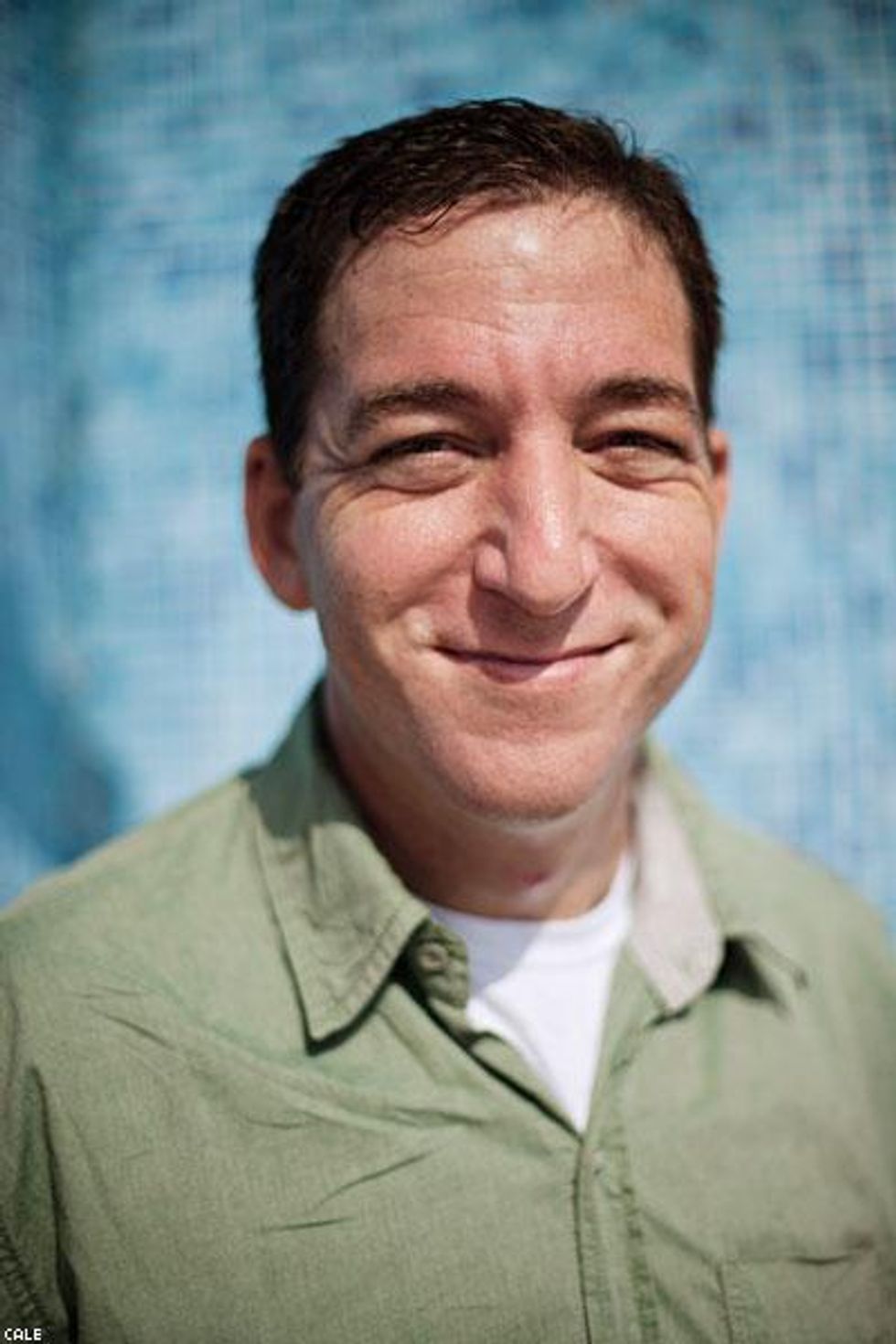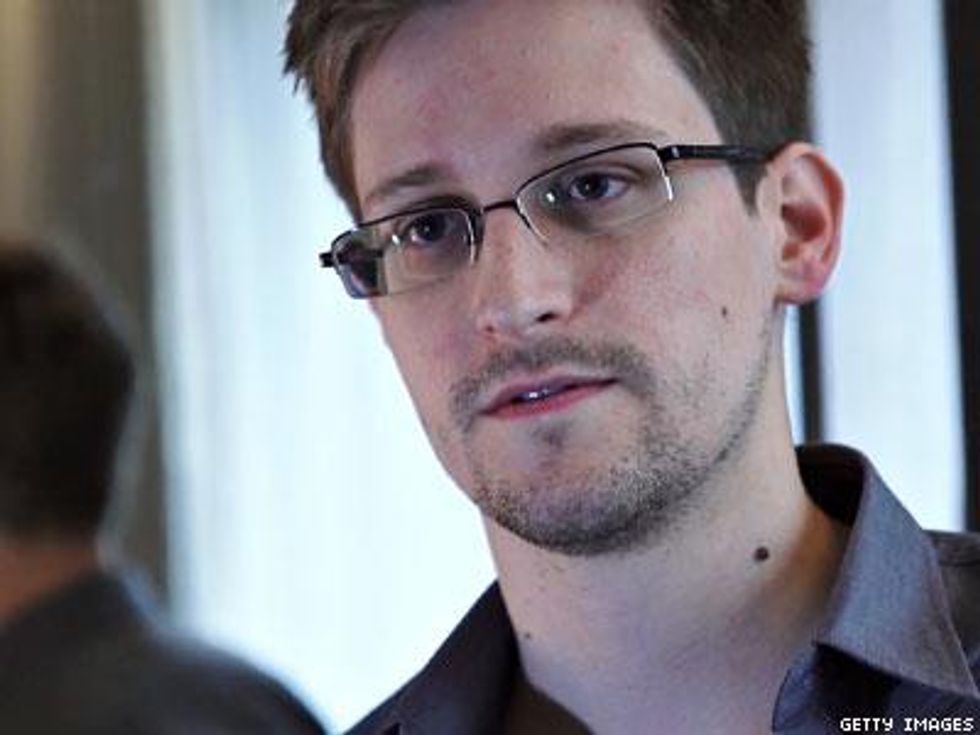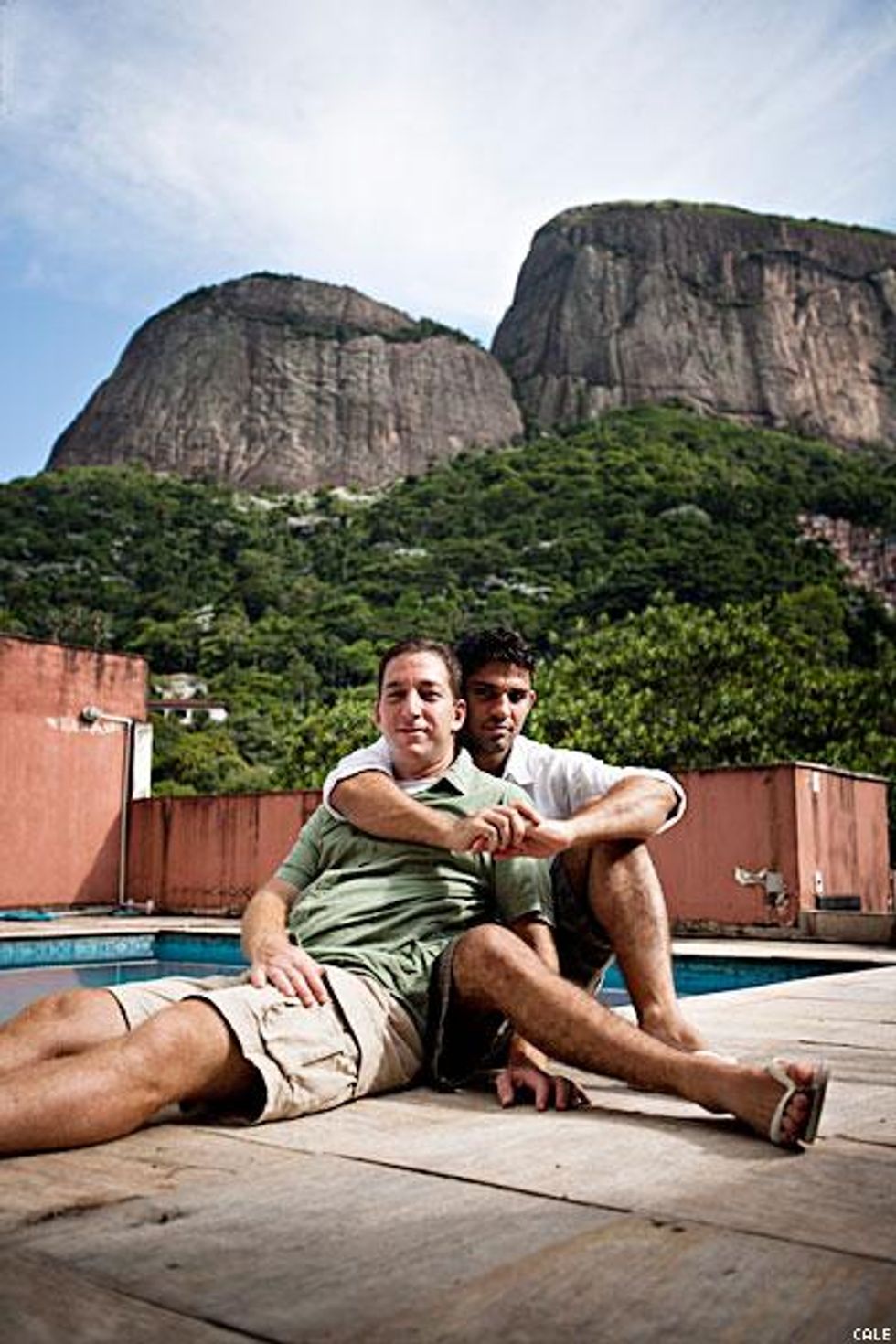
How Glenn Greenwald is taking on the world, and why he'll never stop.
November 12 2013 5:00 AM EST
By continuing to use our site, you agree to our Privacy Policy and Terms of Use.

Glenn Greenwald scrunches over his laptop, the fizzing, glinty look in his eyes settling into something more staid and intense. It's twilight in Gavea, the upscale enclave of Rio de Janeiro built alongside a hand-planted rainforest in the Zona Sul. The monkeys who routinely raise hell from the rubber trees that adorn Greenwald's backyard have fled for the evening. A knot of ten dogs, mostly strays scooped off Rio's traffic-gnarled streets, snore and grumble on the cream tiled floor. Without warning, Greenwald, who has the rat-tat-tat chattiness of Midnight Cowboy's Ratso Rizzo crossing a Manhattan street corner, falls into a chilly silence. His small, fleshy hands flutter over the keyboard. Who knows what business is afoot inside his browser.
The tense quiet stretches on for minutes, made all the more uneasy by legions of invisible toads shamelessly burping from the mangroves. He could be devising his next series of explosive reports on secret Unites States and United Kingdom surveillance programs (he has been working on classified documents on U.S. assassination initiatives). Or, given his open contempt for major media organizations, he could be typing his resignation email to The Guardian. Or he could be prepping for his upcoming testimony before the Brazilian senate about how David Miranda, Greenwald's partner of eight years, was detained and interrogated in Heathrow airport by U.K. officials for nine hours under the Terrorism Act in August. Maybe word has come down that the U.S. Department of Justice has launched a long-anticipated criminal investigation against Greenwald.
Or maybe he's just paying a parking ticket.
"Here." Greenwald snaps his head up and flips his laptop screen toward me as a hyper baby pinscher leaps into his lap. He points to his onscreen chat window. "I'm just talking with Snowden right now." He flashes a chummy grin. "It's our nightly check-in." Greenwald giggles, sips a little red wine, and continues chatting with the 30-year-old former systems analyst whose explosive revelations about the American surveillance state have rocked Washington, put the Obama administration on the defensive, and damaged U.S. relations around the world.
"Moscow kinda sucks," Greenwald reports.
One of the problems with political ideologues is that they can be such a drag. While I've always admired Greenwald's work -- rigorous 3,000-word columns packed with hyperlinks to federal court documents, obscure government memoranda, and dissident dispatches by foreign bloggers -- I worried that in the flesh, Greenwald would be grim, cold, and wonky. His obsession with surveillance and privacy issues have made him into an ideological pillar of the rather sterile, unfriendly world of civil libertarian politics, a group not known for its warmth and humanism.
My hesitation dissipates the instant Greenwald and Miranda pick me up off an Ipanema boulevard in their red mini station wagon. I'm tagging along with the couple to a photo shoot for a feature spread (fully clothed) for the Brazilian edition of Playboy. "It's a very tasteful magazine," Greenwald insists. "It's run by gays!" With Katy Perry playing on the radio, we spend our first hour together mostly talking about Cesar Millan and the tyrannical nature of chihuahuas. Miranda, who has found his own global acclaim and notoriety since being detained at Heathrow, is on his phone trying to coordinate picking up scalped tickets to a sold-out Bon Jovi/Nickleback concert in Rio. "I am going to this concert!" he declares. Greenwald credits Miranda, a Brazilian native who is currently finishing a degree in communications, for his success in journalism. "He's like my Svengali," says Greenwald.
Greenwald, 46, met Miranda, 28, in 2005, on the first day of a two-month vacation in Rio. At the time, Greenwald was just beginning to transition from his job as a constitutional law litigator to fiery polemicist. He was reading on the beach at Copacabana; Miranda was playing beach volleyball. Miranda's beach ball rolled onto Greenwald's towel: "Oi! Meu nome e Glenn." They moved in together that week. "As a gay man, when you come to Rio for seven weeks, you're not looking for a relationship," Greenwald says with a bawdy laugh, "but I never fell in love so fast."
Miranda, born to a protsitute and passed from alcoholic aunt to alcoholic aunt after his mother died when he was four years old, was uneducated until he met Greenwald, and had worked in low-wage jobs in Rio all his life. Their first night together they spoke in broken English and Portuguese. Miranda closed by serenading Greenwald with love songs. "He has the most monotone, atrocious voice," says Greenwald as the three of us have lunch in an upscale Rio mall. "If he sings now, I'm like, 'Oh my god, I can't stand this!' but I was so instantly in love with him that I was convinced I'd found my own Enrique Iglesias on the first note." Now multiple movie studios and TV show developers are courting the couple to dramatize their story:
Woodward and Bernstein for the digital age -- just slightly gayer.
Greenwald and Miranda never moved to the U.S. together because, until the Supreme Court struck down the Defense of Marriage Act in June, Miranda could not get an immigration visa. "For eight years we didn't have that option," Greenwald says, "but then, literally the week DOMA got struck down, this other little barrier to living in the United States popped up: I might be arrested indefinitely the second I got off the plane."
Not that Brazil has been some kind of tropical detention center for Greenwald: "Rio is the best fucking place in the world," he says as we cruise along the white sands of Copacabana. "The people and the culture have taught me a different way to live; it's all spoken to my soul since I got here. The U.S. is more concerned with being an actor in the world and influencing the world. You don't have to be here too long to figure out there's never any thought at any time of invading another country. I mean, I assume if Argentina invaded Brazil for some reason then, yes, OK, but you realize when staying in another country that the notion of constant invasion is extremely radical."
Exile, self-imposed or otherwise, is a state of being that Greenwald seems most comfortable with, anyway. He prides himself on being an iconoclastic outsider and maintains an open disdain for beltway journalists and media pundits whom he regards as "sleazeballs" and "courtiers of power." Media is the church of the "savvy" insiders who only care about who won what, Greenwald says, paraphrasing NYU media critic Jay Rosen. "They hate idealism or anyone who believes in something, because that just seems really naive or loser-ish to them. It makes you a hopeless ideologue or a fringe-y weirdo. The currency they respect is power and success in Washington, and for them that is something to admire instead of be suspicious about or object to." Greenwald delivers this little outlander manifesto with an effusive, cheeky verve. There's no trace of solemnity or pathological political correctness, just a plucky fuck-you attitude that for anyone who has a natural distrust of authority serves as an easy entree to quick camaraderie. Us vs. them.
Edward Snowden broke his general radio silence to tell me via email why he picked Greenwald to bust open his story rather than, say, a more mainstream reporter for the Washington Post or the New York Times.
"The bottom line is that sources risking serious harm to return public information to public hands must have absolute confidence that the journalists they go to will report on that information rather than bury it," Snowden says, clearly referring to the Times' year-long equivocation over publishing reports of the Bush administration's warrantless wiretapping -- a major turning point in both Snowden's and Greenwald's political development. "Glenn's writing consistently demonstrated his belief that journalists should serve people rather than governments, and that gives sources the confidence to shoulder great risks to do good."
In the five days I spent with Greenwald, he revealed himself to be buoyant, chummy, emotional, and a total charmer. It also became clear that the greatest engine driving his work is not a dogged commitment to abstract ideals but the tender relationships he builds with the few who are very close to him, be it Miranda, Snowden, a disembodied screen name on an Internet message board, or the flock of half-blind sclerotic mutts he shepherds.
 Greenwald's immediate family was small and unlucky. Originally from New York City, they settled in South Lake, Fla., then a lower middle-class enclave filled with small, cheap rental housing under constant threat of demolition by condo developers. Greenwald had a housewife mother, Arlene, and an accountant father, Daniel. His parents were never abusive or neglectful. "They were decent," Greenwald assures, "but fucked up in their own ways." Greenwald's father, a short, small, Jewish man, idealized a campy sort of conservatism that repulsed Greenwald. "He had pictures of Oliver North, Ronald Reagan, and John Wayne in his office," Greenwald recalls. "It didn't really have anything to do with politics -- he just idealized this fake machismo, which is something he lacked."
Greenwald's immediate family was small and unlucky. Originally from New York City, they settled in South Lake, Fla., then a lower middle-class enclave filled with small, cheap rental housing under constant threat of demolition by condo developers. Greenwald had a housewife mother, Arlene, and an accountant father, Daniel. His parents were never abusive or neglectful. "They were decent," Greenwald assures, "but fucked up in their own ways." Greenwald's father, a short, small, Jewish man, idealized a campy sort of conservatism that repulsed Greenwald. "He had pictures of Oliver North, Ronald Reagan, and John Wayne in his office," Greenwald recalls. "It didn't really have anything to do with politics -- he just idealized this fake machismo, which is something he lacked." At left: Edward Snowden
At left: Edward Snowden "When I was talking to strangers over the Internet in the 1990s, there would be a much more intense connection because they're disembodied, so it's just your brain and your soul interacting with this other person and it just frees you up in this incredibly empowering way," he says over fries at an outdoor cafe in Leblon, the Beverly Hills of Rio. Over our heads looms a huge poster of an illustrated magazine cover that depicts a bespectacled Snowden gently kissing Vladimir Putin while he surreptitiously places a "Free Pussy Riot" sticker on the Russian prime minister's back. Greenwald sneers, "I hate that cover. It's so stupid."
Greenwald concedes he gets "a little mean" when asked about his or Snowden's feelings on Russia. "I'm well aware of the flaws in Russian society, just like I'm well aware of all the flaws in American society," Greenwald says. "Thousands of people apply for and are given asylum in the U.S. every year, and nobody says, 'Isn't it so weird and ironic that people are applying for asylum in a country that has an ocean prison where people are put in cages without trial for 10 years, uses drones, or torture?'" he says, half annoyed. "The point of asylum is not to declare to the world what country you think is the pinnacle of civilization. The point of asylum is to find a country that's both willing and able to protect you from political persecution." Greenwald adds, "In no way is asylum an endorsement of a country's politics, laws, or values. He didn't choose to be there. He was trying to get transit to Latin America, and then the U.S. revoked his passport and threatened other countries out of offering Snowden safe passage."
At the end of Greenwald's trip to meet Snowden in Hong Kong, he was convinced that Snowden would be snatched up by the U.S. and held in custody without trial for years, much like whistleblower Chelsea Manning, whom Greenwald considers a hero. Manning's three-year pre-trial incarceration and 35-year sentence proves, Greenwald says, that Snowden was right to find harbor anywhere he could. "The question shouldn't be why is Snowden in Russia? The question should be why is America no longer safe for whistleblowers?"
 At left: Greenwald and Miranda at home in Rio de Jainero
At left: Greenwald and Miranda at home in Rio de JaineroA lot has been written about Snowden and Greenwald's professional relationship and the comedy of errors-style course of events surrounding their first meeting. Vastly under-reported is the emotional relationship that has bonded the two men.
When Greenwald first saw Snowden in the restaurant of a Hong Kong hotel, his heart sank. Greenwald had flown across the globe with documentary filmmaker Laura Poitras to meet their anonymous source and was picturing a dandruff-dusted former spook in his 60s -- not an IT guy in his 20s. "He looked so young!" Greenwald exclaims. "He was wearing a white T-shirt, hipster glasses, and sneakers, and I was like, 'Is this the source's son? His assistant? His gay lover? What the fuck is going on?'"
Greenwald and Poitras escorted Snowden to his grungy hotel room. Snowden had not left the room in two weeks and did not want to let any maids in to tidy, so there were stacks of plates everywhere. "I didn't judge," Greenwald says. "I knew he'd worked for the NSA at some point and the situation was fucked in ways I couldn't even understand." Snowden, Greenwald remembers, sensed their disappointment and tension. "It was so tense between us at first, we were both so stiff, and I think we didn't like each other at first," he says. Poitras set up a camera and immediately started filming the two, and Greenwald went into full-blown litigator mode, conducting a six-hour, nonstop examination of Snowden.
"I wanted to find his solid foundation," Greenwald recalls. "I wanted to know he had agency and autonomy." He wanted a deeply satisfying explanation of Snowden's motivations, not only for leaking but for wanting to go public with his identity. "I just needed to know that it was real and grounded in clear-eyed analysis and self-awareness," Greenwald says. "Snowden was giving me bullshit answers."
Snowden continued to insist he was no hero and was just trying to do the right thing as Greenwald fired questions, trying to isolate what informed Snowden's sense of right and wrong, until Snowden gave Greenwald an answer he didn't expect but immediately understood. It wasn't Hegelian theories on power structures or Ron Paul rhetoric about privacy; it wasn't Nietzsche's Genealogy of Morals (Greenwald's greatest influence) or Jeffersonian notions of government. It was comic books and video games. "You have good guys who are forced to do difficult but good things," Snowden said to Greenwald, a bit embarrassed.
Greenwald, who has no interest in either video games or comics, knows first-hand what sort of moral universe they can create for their devotees; Miranda has built his entire ethical code on countless hours of video gameplay.
"It's not a simplistic ideology. David is one of the most complex, intellectually curious, and sophisticated people I've ever met, and he's the one who convinced me that being influenced by the moral dynamics of a comic book or video game is no less noble than being shaped by a novel or a book," Greenwald reasons. "You can watch The Matrix and take it as an action movie, or you can delve into all its greater existentialist meanings. All of the narratives in these comic books are about these single individuals devoted to justice who have the willingness to be brave, who can defeat even the most powerful edifices of evil."
When Miranda was detained in England, Greenwald spent most of those nine hours binge-eating Doritos and talking to Snowden over encrypted chat. "I was furious; I felt so powerless, but I think Snowden was even more outraged."
I ask Greenwald if Snowden told him the names of any of the video games or comic books that influenced him. "No," Greenwald says, laughing. "How the fuck would I know any of that Dungeons and Dragons shit?" But it was the answer he was looking for, authentic and solid. They moved forward and the rest is history, still unfolding before us.
And there's more to come. During our last meeting over a candlelit Thai dinner lubricated with some local red wine, Greenwald is veritably fizzing with all his plans. He's pounding out a book on the Snowden story, set for publication in the spring. And, he warns, there's still a lot of grenades to be thrown from the Snowden document cache. He has some dreams, of course, but the Work comes first.
"I've always thought stability was suffocating and deadly. Like, when I read that the kids I went to law school with have stayed at the same firm, I feel like I'm reading an obituary. How much money do you need? Six million, seven million? Put that in the bank and do something else. Get out!" he says with another sip of wine.
"Can I tell you what I would do with $6 million?" he says with a faraway, almost bashful tone to his voice. "I have this fantasy of buying farmland in Brazil with David and just taking care of as many dogs as we can. Is that totally crazy?"
Charlie Kirk DID say stoning gay people was the 'perfect law' — and these other heinous quotes